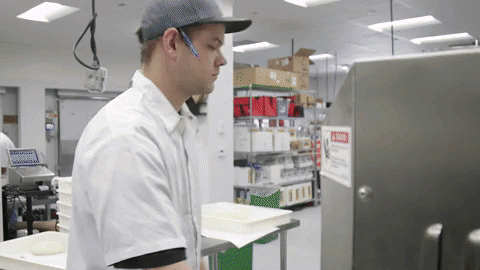Zume Pizza has its eyes set on disrupting legacy pizza players like Pizza Hut and Domino’s by improving on both speed and quality with the help of robots. Over the last two years, founder Julia Collins has been steadily adding new machines to her pizza assembly line to maximize consistency without resorting to cheats that sacrifice the pizza itself.
Today the company is announcing the addition of a “Doughbot” designed to replace a dough spinner. With the new machinery, Zume is ready to announce expansion to Palo Alto, where it will be putting its decentralized delivery model to the test with a fleet of oven trucks and delivery scooters.
The Doughbot shaves 36 seconds off the pizza-creation process. Collins tells me that the equipment is off-the-shelf but that she spared no expense obtaining a machine that wouldn’t overwork the dough or require additives.
Oftentimes when dough is put through a press, it’s augmented with unnatural oils and chemicals designed to keep the dough from shrinking back into a ball. The extra-powerful Doughbot is able to do its job using only natural oils — no need for additional chemicals.
Shaving a few seconds off pizza build time might not seem like a big deal, but it’s the key to Zume’s business model. The startup aims to completely shake up the retail chain pizza delivery model. Instead, Zume will have a single hub in each city for making pizzas. And rather than bags of pizza in the back of some teenager’s 1998 Toyota, Zume plans to use a sophisticated network of oven trucks, mopeds and pizza re-supply vans.

Zume hopes its decentralized pizza delivery model will allow it to react more quickly to shifting demand and take better advantage of demand projections. When traditional pizza delivery restaurants decide to expand to a new location, they have to make a bet on demand. There’s not much these players can do when desire for pizza spikes or crashes — each has fixed production.
In contrast, Zume can quickly reposition its operations because pizzas are baked onboard specialty trucks that can be moved at any time to meet customer needs. The downside of this model is that it turns the central hub of pizza making robots into a bottleneck. Only by increasing throughput by cutting down on pizza-creation time can the company overcome this.
Susan Alban, the former GM leading UberEATS, is joining Zume to manage these complex logistical operations. The startup says it has six pizza baking trucks already on the road and it will be adding four more soon.
